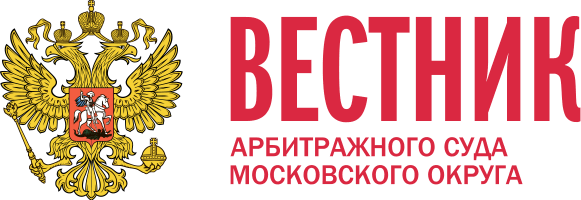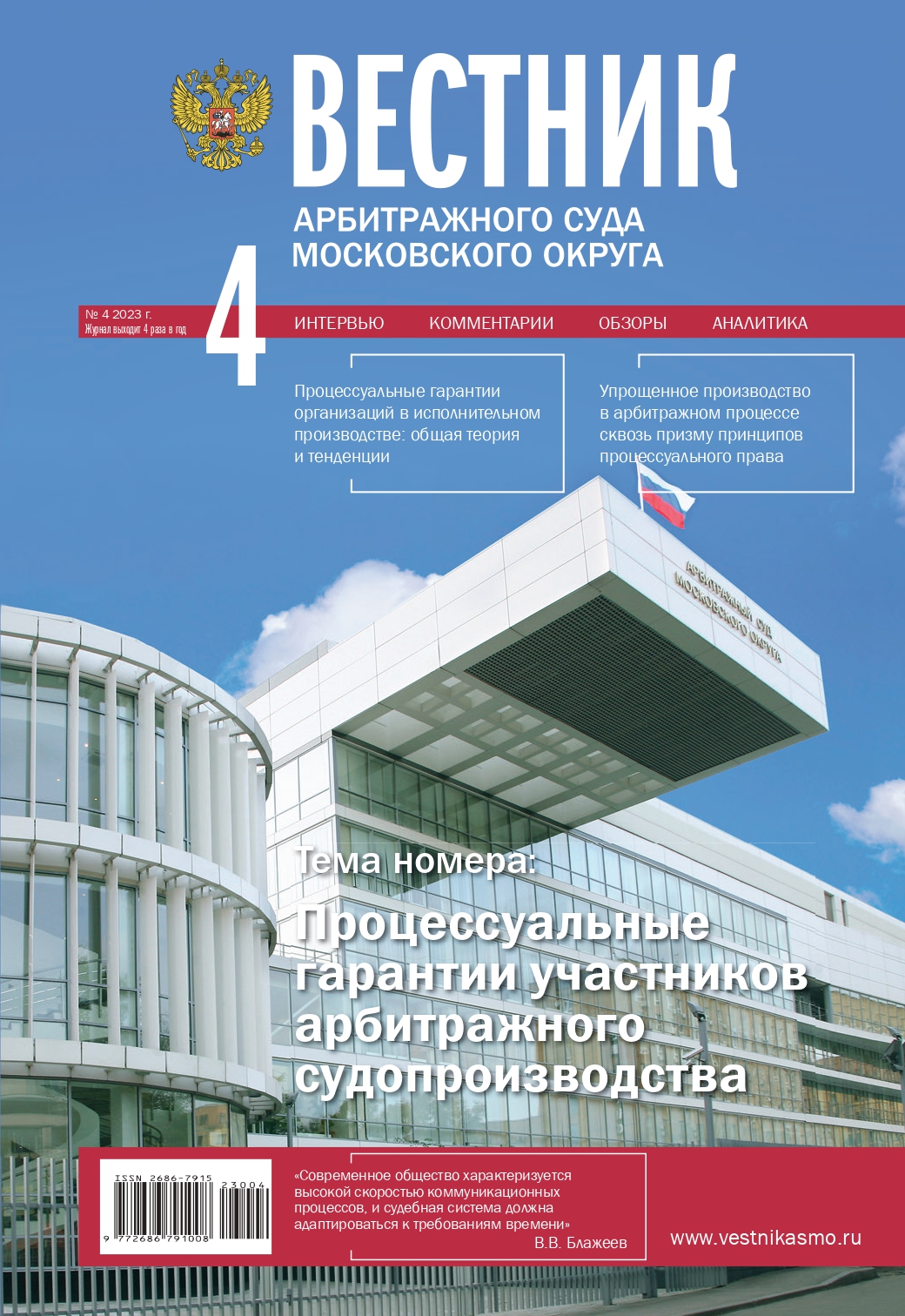Courts News
News of Moscow District Courts
Interview of the issue
V.V. Blazheev. Modern society is characterized by a high speed of communication, and the judicial system must adapt to the requirements of the present days
Topicality
Exclusive competence of Russian arbitrazh (commercial) courts in disputes involving persons in respect of whom foreign public-law entities have applied restrictive measures
Analytics: Procedural guarantees for participants in arbitrazh (commercial) proceedings
D.Kh. Valeev, N.N. Makolkin Procedural guarantees of organizations in enforcement proceedings: general theory and trends
The authors consider the general theory of procedural guarantees existing at the stage of enforcement proceedings. The authors emphasize the classification of procedural guarantees and note that each stage of enforcement proceedings may have its own specific guarantees. In this case the authors divide procedural guarantees on the basis of the volume of regulating action, target purpose, nature of tasks. The authors state that procedural guarantees in enforcement proceedings are only formulated and arise as a result of digitalization of society in general and this sphere of law enforcement in particular.
Keywords: procedural guarantees, enforcement proceedings, execution of judicial and non-judicial acts, execution, arbitration process, civilistic process
DOI: 10.46279/ASMO.2023.50.19.001
N.A. Gromoshina Simplified proceedings in the arbitration process through the prism of the principles of procedural law
To answer the debatable, but of practical importance, question of whether simplified proceedings are legal proceedings and justice, the procedure of simplified proceedings is considered from the point of view of the operation of the basic principles of procedural law in this proceeding. In the course of the analysis, the proposed changes in the arbitration procedural legislation were also used. As a result, it is concluded that the principles of procedural law are implemented in simplified proceedings and justice is carried out
Keywords: principles of procedural law; organizational and functional principles; functional principles; simplified proceedings; justice; procedural form
DOI: 10.46279/ASMO.2023.48.71.002
M.R. Zagidullin Legal responsibility as a procedural guarantee of the rights of participants of arbitrazh proceedings
The effectiveness of protection of the rights of participants of arbitrazh (commercial) proceedings depends entirely on the system of procedural guarantees. Legal responsibility within the concept of correlation with sanctions is close to the latter. At the same time, sanctions may include both measures of legal responsibility and measures of protection of the right. Accordingly, legal responsibility is not only ‘punishment’, but also ‘protection’. Protection of procedural rights, which are also elements of the procedural legal status of subjects of arbitrazh procedural legal relations, and legal responsibility acts as one of the procedural guarantees of the rights of participants in arbitrazh proceedings. In this connection the most actual and practically significant sanctions in arbitrazh proceedings are considered.
Keywords: legal responsibility in arbitrazh proceedings, sanction and legal responsibility, measures of legal responsibility in arbitrazh proceedings, measures of protection in arbitrazh proceedings, procedural guarantees of rights, civil procedural responsibility, court fine, recovery of compensation for loss of time, reclamation of evidence, legal fictions, falsification of evidence, private determination, bad faith procedural behavior, abuse of procedural right
DOI: 10.46279/ASMO.2023.63.26.003
Analytics: Russian anti-sanctions regulation
A.V. Gabov, V.A. Laptev Disputes with the participation of persons in relation to which sanctions (restrictive measures) are introduced: Competence and features of consideration
After the adoption of the Federal Law of June 8, 2020 No. 171-FZ “On Amendments to the Arbitration Procedure Code of the Russian Federation in order to protect the rights of individuals and legal entities in connection with restrictive measures introduced by a foreign state, state association and (or) union and (or) a state (interstate) institution of a foreign state or a state association and (or) union” in domestic procedural law, a new category of cases is enshrined within the jurisdiction of an arbitration court — disputes involving persons in respect of whom restrictive measures have been introduced by foreign states and international organizations. The proposed article examines the goals of legislative regulation, determines the circle of persons who can use the mechanism of Art. 248.1 of the Arbitration Procedure Code of the Russian Federation, the features of the application of this article, taking into account the legal positions of the Supreme Court of the Russian Federation, as well as decisions of district arbitration courts; ways of solving a number of problematic issues in the application of relevant procedural norms are proposed.
Keywords: arbitration court, competence, exclusive competence, sanctions (restrictive measures), sanctions regime
DOI: 10.46279/ASMO.2023.49.75.004
Y.G. Bogatina Anti-sanctions measures: Concept and their realization in judicial practice
Anti-sanctions measures are a legal way of responding to unfriendly actions of foreign states. The countermeasures introduced in the Russian Federation clearly define the persons and relations subject to them and the grounds for application of such measures. Understanding the principles and objectives of countermeasures, as well as ways to achieve them, as well as the correct qualification of relations falling under the anti-sanctions regulation, allow to maintain a generally favorable investment climate in the country.
Keywords: countermeasures, anti-sanctions measures, retorsions, repressions, sovereignty, relations complicated by foreign element, sanctions, foreign investor, national regime, exemptions from the national regime
DOI: 10.46279/ASMO.2023.87.31.005
A.V. Shilyaev Registration of rights to real estate as an element of anti-sanctions policy
The article is devoted to legal aspects of the state registration of rights to real estate on the territory of the Donetsk and Lugansk People’s Republics, Zaporozhskaya and Kherson regions, which became part of the Russian Federation. The author highlights the peculiarities of legal regulation of this type of legal relations and the possibility of application of judicial practice of the Moscow region, notes the role of state registration of rights to immovable property in the new subjects in overcoming destabilizing factors (sanctions).
Keywords: state registration of rights, real estate, property, institute of civil amnesties, sanctions, anti-sanctions policy, judicial practice
DOI: 10.46279/ASMO.2023.57.65.006
Analytics: Open Tribune
T.P. Shishmareva Civil liability of the Arbitration manager: Grounds, conditions, insurance
The article examines the legal nature, grounds, conditions, and form of civil liability of insolvency practitioners. The author defines the civil liability of arbitration managers as tortious liability and analyzes the problems arising in law enforcement practice. Particular attention is paid to insuring the liability of insolvency practitioners: concluding a contract, interpreting an insured event. The features of financing the liability of arbitration managers by self-regulatory organizations and payments to victims from compensatory financing are analyzed.
Keywords: arbitration manager, liability, tort, insurance compensation, compensation fund, grounds and conditions of liability
DOI: 10.46279/ASMO.2023.41.81.007
S.I. Lutsenko The institution of artificial intelligence and the concept of an ‘electronic person’ in the legal plane
The author examines the features of the organic implementation of artificial intelligence in Russian legislation (the legal definition of the institution ‘artificial intelligence’) taking into account international experience. The concept of ‘electronic person’ is considered. The features of the mechanism of liability for harm (the model of responsibility without guilt) for others when using an artificial intelligence system are analyzed. The author analyzes the features of the mechanism of liability for harm (the model of responsibility without guilt) for others when using an artificial intelligence system.
Keywords: artificial intelligence, technologies, copyright, intellectual property object, concept of ‘electronic person’, source of increased danger, model of responsibility without guilt
DOI: 10.46279/ASMO.2023.69.37.008
A.A. Popov Ensuring procedural discipline of participants in arbitrazh proceedings in conditions of greater activity of the court during the consideration of the case
The development of the adversarial principle, which is taking place in judicial practice towards the manifestation of greater activity of the arbitrazh (commercial) court of the first instance when considering and resolving a dispute on the merits, does not contribute to ensuring the proper implementation of the assigned procedural duties by the persons participating in the case, and therefore it is relevant to raise the question of means and methods of ensuring their procedural discipline. Based on the results of the analysis of current legislation and law enforcement practice, the author comes to the conclusion that currently arbitrazh courts have at their disposal two legally provided procedural institutions that allow to stimulate the parties to the dispute in the implementation of their duties — this is the distribution of court costs and the issuance of a private determination, the potential of which is not in full, but in relation to the institute the private definition is not implemented at all. In this regard, the author offers a justification for the possibility of making a private determination in cases of non-fulfillment by the parties of their procedural duties, as well as the need for appropriate explanations from the highest judicial body of the country and conducting scientific research on the development of new means and ways to overcome the passive procedural behavior of persons participating in the case in the changing mechanism of building an adversarial process.
Keywords: arbitrazh process; competitiveness; the role of the court; court activity; process management; procedural discipline; distribution of court costs; particular decision
DOI: 10.46279/ASMO.2023.15.20.009
S.V. Prudnikov, K.S. Kovalev Screenshots as evidence in arbitrazh proceedings: Practical aspect
The authors study the modern experience of application of screenshots as admissible, relative and sufficient evidence in various categories of cases considered in arbitrazh (commercial) courts on the example of judicial practice of the Tenth Commercial Court of Appeal, as well as the analysis of foreign legislation and judicial practice.
Keywords: screenshot, evidence, judicial act, relativity, admissibility, sufficiency, reliability
DOI: 10.46279/ASMO.2023.56.40.010
Court practice reviews
Review of сourt practice on disputes arising from leasing agreement


